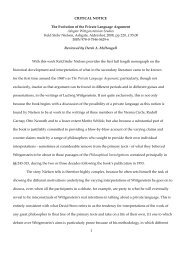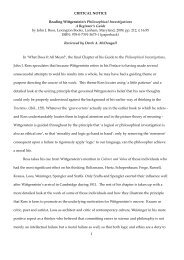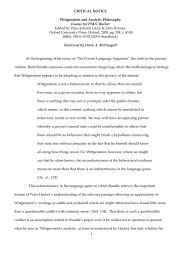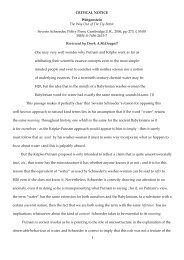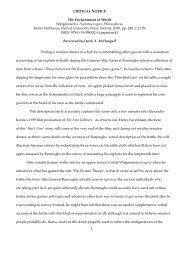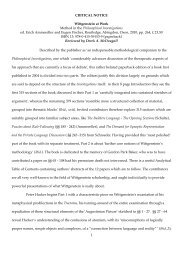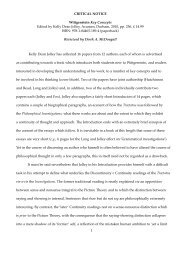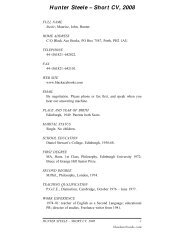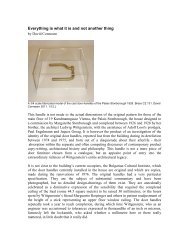Wittgenstein's Philosophical Investigations A Critical Guide
Wittgenstein's Philosophical Investigations A Critical Guide
Wittgenstein's Philosophical Investigations A Critical Guide
You also want an ePaper? Increase the reach of your titles
YUMPU automatically turns print PDFs into web optimized ePapers that Google loves.
In his ‘Are meaning, understanding etc. definite states ?’, John McDowell reminds<br />
us that Wittgenstein is not objecting to our ordinary ways of talking when we say, for example,<br />
that in coming to understand the principle of a series, we have come to grasp something which<br />
in a rather innocuous way can be said to determine the answer one will be inclined to give at<br />
some later point in its development (Ibid., 176). What Wittgenstein is objecting to is the kind of<br />
mythology which begins to surround this way of talking when doing philosophy, a mythology<br />
which would include a picture of our ‘mental equipment’ in which our capacity to ‘grasp a rule’,<br />
for example, appears as some kind of ‘configuration in the occult medium of the mind’ (Ibid.)<br />
This would suggest, in more general terms, that our ‘ordinary ways of talking’ ought<br />
not to be regarded per se as incorporating philosophical (metaphysical) presuppositions. Yet that<br />
these forms of expression are so often taken for granted to presuppose just this, is a point that<br />
Wittgenstein emphasises in § 402, where disputes between Idealists, Solipsists and Realists are<br />
described in the following terms: ‘The one party attack the normal form of expression as if they<br />
were attacking a statement; the others defend it, as if they were stating facts recognised by every<br />
reasonable human being’. The ‘normal form of expression’ is automatically seen by one party to<br />
incorporate metaphysical presuppositions, which can be attacked on philosophical grounds; and<br />
the opposing party automatically defends the ordinary way of speaking as if confirming that there<br />
really were presuppositions of this kind at stake. But for Wittgenstein, what are being attacked<br />
and defended are ‘houses of cards’ (§ 118). Our ordinary ways of speaking are not up for this kind<br />
of philosophical assessment, because it is central to his methodology that these ways of speaking<br />
are only ‘after all performing their office’.<br />
McDowell quotes § 195 as a classic confirmation that what we actually mean when we talk<br />
about grasping a sense is nothing to do with the causal determination of future use. It seems only<br />
that in a queer way the use is already in some sense present; and so it is, Wittgenstein confirms,<br />
‘in some sense’. Understood apart from its ordinary everyday use, and incorporated into a ‘special’<br />
language-game supposedly invented by the philosopher, it becomes queer ; but the very idea that<br />
26



